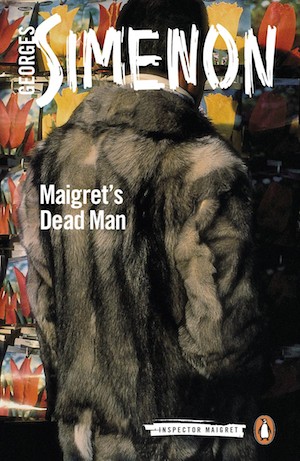
We find pipe smoking Maigret, at the opening of the 29th book in the series, in his office humoring a paranoid woman. The old lady claims that her son-in-law and daughter are attempting to slowly poison her. Maigret occasionally stokes his potbelly stove while he listens and is relieved of the conversation when he receives a telephone call.
A man is patched through who doesn’t tell Maigret his name, saying it is not significant. The man claims that he is being followed and will soon be killed. He begs Maigret to send a plainclothes detective out to the bar Caves Du Beaujolais to save him. The line goes silent. Maigret, quite possibly because of the paranoid woman in his office or because he has been on the job for 30 years, doesn’t give the phone call much credence.
A few more phone calls follow that day, all from the same man but in different places, and Maigret becomes more engaged. He calls one of the mysterious man’s previous locations and gets the proprietor to give him a description. The man who keeps calling is short, he is wearing a beige raincoat, and his face is hidden by a gray hat.
By then it’s too late. The man ends up dead. His body is dumped from a car on Place de la Concorde. Maigret takes the death personally and assumes that ‘this dead man was his dead man’ because he didn’t take the man’s calls as serious as he might have.
Georges Simenon was prolific and wrote 76 Maigret novels and 28 short stories in all. Simenon did a lot with the police procedural sub-genre in his Maigret series and they are a delight as well as a master class in crime fiction. It is pure fun to watch Maigret piece clues together even if the details can get confusing at times. Maigret finds clues everywhere, often to his own and our surprise.
Paris is wonderfully evoked in this book and acts as a central character. Maigret’s Dead Man takes place in spring and you can really feel the season in the story. Specific places are named as you watch the pipe toting Maigret figure out who killed the anonymous trench coat wearing man and it is exciting to see where we will end up next on this tour of Paris. But you don’t just read Simenon for the places named or the puzzling mystery, you read him most of all for the noir mood he evokes – the blue smoke and shadow-drenched cobblestones.
Maigret works to embody the world of the dead man as he tries to figure out the mystery of his death. Maigret lives the man’s life trying to figure out who has taken out his Dead Man. There is a haunted and haunting quality to Maigret in this book which adds an existential depth to the text that elevates what the French call a roman policier to something more literary. Maigret’s Dead Man is translated by David Coward, who has translated a few others in the series, and he does a wonderful job. The words bound off the page fresh as ever.
Simeon’s books occupy an important place in French literature, though he is often overlooked quite possibly because he produced so much (he published nearly 500 novels.) Simenon’s Maigret novels have a literary quality to them not often found in procedurals. We get the intimate Parisian social drama in his books like that found in the 19th-century novels of Zola, where murder is personal and often vengeful. There is also a modern existential tone evocative of Sartre and Camus, where Maigret often contemplates identity, his meaning, and his profession as he does here.
Maigret’s Dead Man is literary noir from the French master that should satisfy fans of classic crime fiction, readers new to the series, as well as francophiles who delight in books richly French.
The Maigret series begins with Pietr the Latvian, which we reviewed here.
Penguin Classics
Print/Kindle/iBook
£4.99
Rating: 5 Stars